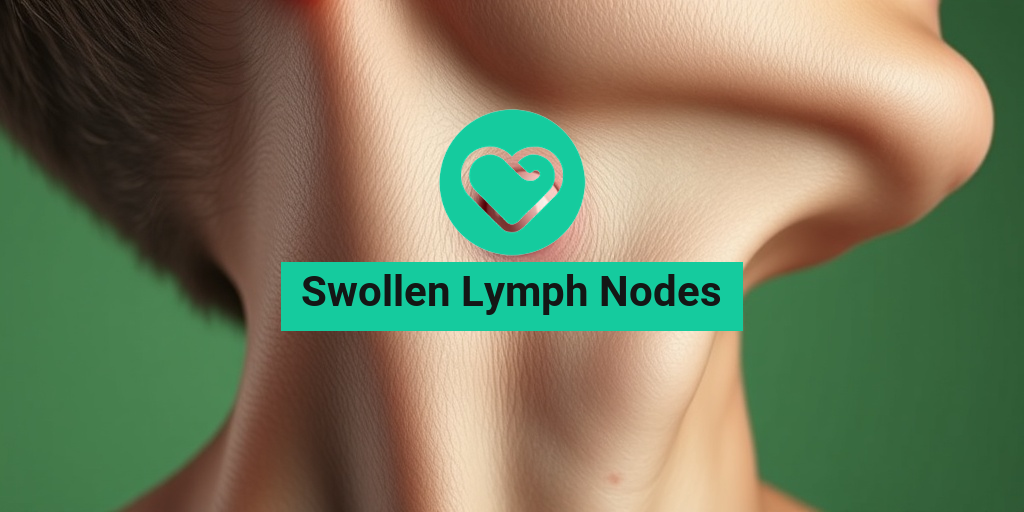What Are Lymph Nodes?
Lymph nodes are small, bean-shaped structures that play a crucial role in your body’s immune system. They are part of the lymphatic system, which is a network of vessels and organs that help maintain fluid balance, filter out harmful substances, and support immune function. You can find lymph nodes throughout your body, including in your neck, armpits, and groin.
Function of Lymph Nodes
The primary function of lymph nodes is to filter lymph fluid, which contains white blood cells, bacteria, and other foreign substances. When your body detects an infection or illness, lymph nodes can become active, producing more white blood cells to fight off the invaders. This process often leads to the swelling of lymph nodes, which is a sign that your body is working hard to protect itself.
Where Are Lymph Nodes Located?
Lymph nodes are distributed throughout the body, but some common areas where they are found include:
- Neck: Often the first place people notice swollen lymph nodes.
- Armpits: Swollen lymph nodes here can indicate infections or other health issues.
- Groin: Lymph nodes in this area can swell due to infections or injuries.
- Behind the ears: These nodes can swell in response to ear infections or other illnesses.
Understanding the role of lymph nodes is essential for recognizing when something might be wrong in your body. If you notice swelling in these areas, it could be a sign of an underlying condition that requires attention.
Symptoms of Swollen Lymph Nodes
Swollen lymph nodes can be a common occurrence, especially when your body is fighting off an infection. However, it’s essential to recognize the symptoms associated with swollen lymph nodes to determine if further medical evaluation is necessary.
Common Symptoms
When lymph nodes swell, they may present with various symptoms, including:
- Pain or tenderness: Swollen lymph nodes can be painful to the touch, especially if they are inflamed.
- Size increase: You may notice that the lymph nodes feel larger than usual, which can be alarming.
- Redness or warmth: The skin over the swollen lymph nodes may appear red or feel warm, indicating inflammation.
- Fever: A fever may accompany swollen lymph nodes, suggesting an infection.
- Fatigue: Feeling unusually tired can be a sign that your body is fighting off an illness.
Specific Areas of Swelling
Swollen lymph nodes can occur in various parts of the body, and the location can provide clues about the underlying cause:
- Swollen lymph nodes in neck: Often associated with respiratory infections, such as colds or strep throat.
- Swollen lymph nodes in armpit: May indicate infections in the arms or breasts.
- Swollen lymph nodes in groin: Can be linked to infections in the lower body or sexually transmitted infections.
- Swollen lymph nodes under jaw: Commonly seen with dental issues or throat infections.
- Swollen lymph nodes behind ear: Often related to ear infections or scalp conditions.
When to Seek Medical Attention
While swollen lymph nodes are often harmless and resolve on their own, there are times when you should consult a healthcare professional. Seek medical attention if:
- The swelling persists for more than two weeks.
- You experience severe pain or discomfort.
- You have accompanying symptoms like high fever, night sweats, or unexplained weight loss.
- The swollen lymph nodes are hard or fixed in place.
Understanding the symptoms of swollen lymph nodes can help you take proactive steps in managing your health. If you have concerns, consider visiting Yesil Health AI for evidence-based health answers and guidance.
In conclusion, swollen lymph nodes are a common response to infections and other health issues. By recognizing the symptoms and understanding their significance, you can better navigate your health and seek appropriate care when necessary. 🌟

Common Causes of Swollen Lymph Nodes
Swollen lymph nodes, also known as lymphadenopathy, can be a common occurrence and often indicate that your body is fighting off an infection or illness. Understanding the common causes of swollen lymph nodes can help you identify when to seek medical attention. Here are some of the most prevalent reasons:
Infections
One of the primary reasons for swollen lymph nodes is infections. These can be viral, bacterial, or even fungal. Here are some specific infections that may lead to lymph node swelling:
- Viral Infections: Conditions like the common cold, influenza, and mononucleosis can cause lymph nodes to swell, particularly in the neck and under the jaw.
- Bacterial Infections: Bacterial infections such as strep throat or skin infections can lead to localized swelling in the lymph nodes.
- Fungal Infections: Although less common, certain fungal infections can also result in swollen lymph nodes.
Autoimmune Diseases
Autoimmune diseases occur when the immune system mistakenly attacks healthy cells. Conditions such as lupus and rheumatoid arthritis can lead to swollen lymph nodes as the body’s immune response becomes activated.
Cancers
In some cases, swollen lymph nodes may indicate the presence of cancer. This can include:
- Lymphoma: A type of cancer that originates in the lymphatic system.
- Leukemia: A cancer of the blood that can cause lymph nodes to swell.
- Metastatic Cancer: Cancers from other parts of the body can spread to lymph nodes, causing them to enlarge.
Other Causes
There are several other factors that can lead to swollen lymph nodes, including:
- Medications: Certain medications can cause lymphadenopathy as a side effect.
- Allergic Reactions: Allergies can sometimes trigger swelling in the lymph nodes.
- Injury or Trauma: An injury to a nearby area can cause lymph nodes to swell as they respond to inflammation.
Risk Factors for Swollen Lymph Nodes
While swollen lymph nodes can happen to anyone, certain risk factors may increase your likelihood of experiencing this condition. Understanding these factors can help you take proactive steps to maintain your health.
Age
Age can play a significant role in the likelihood of developing swollen lymph nodes. Children are more prone to infections that can cause lymphadenopathy, while older adults may experience swelling due to chronic conditions or cancers.
Weakened Immune System
If you have a weakened immune system due to conditions like HIV/AIDS, cancer treatments, or autoimmune diseases, you may be at a higher risk for infections that can lead to swollen lymph nodes.
Geographical Location
Your geographical location can also influence your risk. Certain infections, such as tuberculosis or cat scratch fever, are more prevalent in specific areas, increasing the likelihood of swollen lymph nodes.
Exposure to Infections
Frequent exposure to infections, whether through close contact with sick individuals or through travel to areas with endemic diseases, can increase your risk of developing swollen lymph nodes.
Chronic Health Conditions
Individuals with chronic health conditions, such as diabetes or heart disease, may have a higher risk of infections, which can lead to swollen lymph nodes. Maintaining a healthy lifestyle and managing these conditions can help mitigate this risk.
In summary, swollen lymph nodes can be caused by a variety of factors, including infections, autoimmune diseases, and even cancers. Being aware of the common causes and risk factors can empower you to take charge of your health and seek medical advice when necessary. If you notice persistent swelling or other concerning symptoms, it’s essential to consult a healthcare professional for a proper diagnosis and treatment. 🌟

How Swollen Lymph Nodes Are Diagnosed
Swollen lymph nodes can be a source of concern for many individuals. They often indicate that your body is fighting an infection or another underlying issue. Understanding how these swollen nodes are diagnosed can help alleviate anxiety and provide clarity on what to expect during the process. 🩺
Initial Consultation
The diagnosis of swollen lymph nodes typically begins with an initial consultation with a healthcare provider. During this visit, the doctor will:
- Review your medical history: This includes any recent illnesses, infections, or chronic conditions.
- Conduct a physical examination: The doctor will palpate (feel) the lymph nodes in various areas, such as the neck, armpits, and groin, to assess their size, tenderness, and consistency.
- Ask about symptoms: You may be asked about other symptoms you are experiencing, such as fever, night sweats, or weight loss.
Diagnostic Tests
If the doctor suspects that the swollen lymph nodes are due to an underlying condition, they may recommend further diagnostic tests. These can include:
- Blood tests: These tests can help identify infections, immune disorders, or blood cancers.
- Imaging studies: Techniques such as ultrasound, CT scans, or MRI can provide detailed images of the lymph nodes and surrounding tissues.
- Biopsy: In some cases, a small sample of lymph node tissue may be taken for laboratory analysis to rule out malignancies.
Each of these tests plays a crucial role in determining the cause of the swollen lymph nodes and guiding appropriate treatment. 🧪
When to Seek Medical Attention
While swollen lymph nodes are often harmless and resolve on their own, there are specific situations where you should seek medical attention:
- If the swelling persists for more than two weeks.
- If the lymph nodes are hard, fixed, or growing in size.
- If you experience unexplained weight loss, fever, or night sweats.
Being proactive about your health is essential, and understanding the diagnostic process can empower you to take the right steps. 💪
Complications of Swollen Lymph Nodes
While swollen lymph nodes are often a sign that your body is fighting an infection, they can sometimes lead to complications. Understanding these potential issues is vital for managing your health effectively. ⚠️
Infection Spread
One of the most common complications associated with swollen lymph nodes is the potential for infection spread. If the lymph nodes are swollen due to an infection, there is a risk that the infection could spread to nearby tissues or even into the bloodstream, leading to:
- Abscess formation: This is a localized collection of pus that can occur if the infection is not adequately treated.
- Sepsis: A severe and life-threatening response to infection that can occur if bacteria enter the bloodstream.
Underlying Conditions
Swollen lymph nodes can also be a symptom of more serious underlying conditions, such as:
- Lymphoma: A type of cancer that originates in the lymphatic system.
- Leukemia: A cancer of the blood that can cause lymph nodes to swell.
Early detection and treatment of these conditions are crucial for improving outcomes, making it essential to monitor any persistent swelling. 🔍
Chronic Lymphadenopathy
In some cases, swollen lymph nodes can lead to a condition known as chronic lymphadenopathy, where the lymph nodes remain enlarged for an extended period. This can be due to:
- Autoimmune disorders: Conditions like lupus or rheumatoid arthritis can cause chronic swelling.
- Chronic infections: Persistent infections such as tuberculosis can lead to long-term lymph node enlargement.
Managing chronic lymphadenopathy often requires a comprehensive approach, including lifestyle changes and medical treatment. 🏥
Understanding the complications associated with swollen lymph nodes can help you take proactive steps in your health journey. If you notice any concerning symptoms, don’t hesitate to reach out to a healthcare professional for guidance. 🌟

Treatment Options for Swollen Lymph Nodes
Swollen lymph nodes can be a source of concern for many individuals. They often indicate that your body is fighting an infection or dealing with another health issue. Understanding the treatment options available can help you manage this condition effectively.
Home Remedies
For mild cases of swollen lymph nodes, especially those caused by common infections, home remedies can be quite effective. Here are some options to consider:
- Warm Compress: Applying a warm compress to the affected area can help reduce swelling and alleviate discomfort. Simply soak a clean cloth in warm water, wring it out, and place it on the swollen lymph nodes for 15-20 minutes.
- Hydration: Staying well-hydrated is crucial. Drinking plenty of fluids can help your body fight off infections and reduce inflammation.
- Rest: Giving your body time to heal is essential. Ensure you get adequate rest to support your immune system.
- Over-the-Counter Pain Relievers: Medications like ibuprofen or acetaminophen can help relieve pain and reduce swelling.
Medical Treatments
If home remedies do not alleviate the symptoms or if the swelling persists, it may be time to consult a healthcare professional. Here are some medical treatments that may be recommended:
- Antibiotics: If swollen lymph nodes are due to a bacterial infection, your doctor may prescribe antibiotics to help clear the infection.
- Antiviral or Antifungal Medications: In cases where a viral or fungal infection is the cause, specific antiviral or antifungal medications may be necessary.
- Corticosteroids: For severe inflammation, corticosteroids may be prescribed to reduce swelling and discomfort.
- Surgery: In rare cases, if a lymph node is severely infected or if there is a suspicion of cancer, surgical intervention may be required to remove the lymph node.
Managing Underlying Conditions
Sometimes, swollen lymph nodes are a symptom of a more serious underlying condition, such as autoimmune diseases or cancers. In such cases, treating the underlying condition is crucial. This may involve:
- Immunotherapy: For certain cancers, immunotherapy can help your body fight the disease.
- Chemotherapy or Radiation: These treatments may be necessary for cancer-related swollen lymph nodes.
When to See a Doctor
While swollen lymph nodes are often harmless and resolve on their own, there are specific situations where you should seek medical attention. Knowing when to see a doctor can help prevent complications and ensure proper treatment.
Signs You Shouldn’t Ignore
If you experience any of the following symptoms alongside swollen lymph nodes, it’s essential to consult a healthcare professional:
- Persistent Swelling: If the lymph nodes remain swollen for more than two weeks without improvement, it’s time to get checked.
- Fever: A high fever that accompanies swollen lymph nodes may indicate a serious infection.
- Night Sweats: Unexplained night sweats can be a sign of an underlying health issue.
- Unexplained Weight Loss: Losing weight without trying can be a red flag and should be evaluated by a doctor.
- Difficulty Breathing or Swallowing: If swollen lymph nodes are causing breathing or swallowing difficulties, seek immediate medical attention.
Consulting a Specialist
In some cases, your primary care physician may refer you to a specialist, such as an infectious disease expert or an oncologist, for further evaluation and treatment. This is especially true if there are concerns about cancer or other serious conditions.
In conclusion, while swollen lymph nodes can often be managed at home, it’s crucial to be aware of when to seek medical help. Early intervention can lead to better outcomes and peace of mind. Remember, your health is paramount! 🩺💪

Frequently Asked Questions about Swollen Lymph Nodes
What are swollen lymph nodes?
Swollen lymph nodes are enlarged lymph nodes that can occur in various parts of the body, including the neck, armpits, and groin. They often indicate that the body is fighting an infection or illness.
What causes swollen lymph nodes?
Swollen lymph nodes can be caused by a variety of factors, including:
- Infections (viral or bacterial)
- Immune system disorders
- Cancers, such as lymphoma or leukemia
- Localized infections, such as dental abscesses
Are swollen lymph nodes in the neck common?
Yes, swollen lymph nodes in the neck are quite common and often occur due to infections like the common cold or strep throat. They can also swell in response to other illnesses.
What should I do if I have swollen lymph nodes in my armpit?
If you notice swollen lymph nodes in your armpit, it is advisable to monitor them for changes. If they persist for more than a couple of weeks, become painful, or are accompanied by other symptoms, consult a healthcare professional.
Can swollen lymph nodes in the groin indicate a serious condition?
Swollen lymph nodes in the groin can sometimes indicate a serious condition, especially if they are hard, fixed, or accompanied by other concerning symptoms. It’s important to seek medical advice if you have any doubts.
What does it mean if I have swollen lymph nodes on one side of my neck?
Swollen lymph nodes neck one side can suggest a localized infection or inflammation. It’s often related to conditions affecting the throat, ears, or teeth. If the swelling persists, a medical evaluation is recommended.
How can I relieve discomfort from swollen lymph nodes under my jaw?
To relieve discomfort from swollen lymph nodes under the jaw, you can try:
- Applying a warm compress
- Taking over-the-counter pain relievers
- Staying hydrated
If the swelling does not improve, consult a healthcare provider.
When should I see a doctor for swollen lymph nodes?
You should see a doctor if:
- The swollen lymph nodes are larger than 1 inch
- They persist for more than two weeks
- You experience fever, night sweats, or unexplained weight loss
Can swollen lymph nodes behind the ear be a sign of something serious?
Swollen lymph nodes behind the ear can indicate an infection or other health issues. If they are painful or persist, it’s important to seek medical advice.
Are swollen lymph nodes in the groin more common in males or females?
Swollen lymph nodes in the groin can occur in both males and females. However, the underlying causes may differ based on gender, such as certain infections or conditions that are more prevalent in one sex.
What does it mean if I have multiple swollen lymph nodes?
Having multiple swollen lymph nodes can indicate a systemic response to an infection or illness. It’s essential to consult a healthcare provider for a proper diagnosis and treatment plan.




